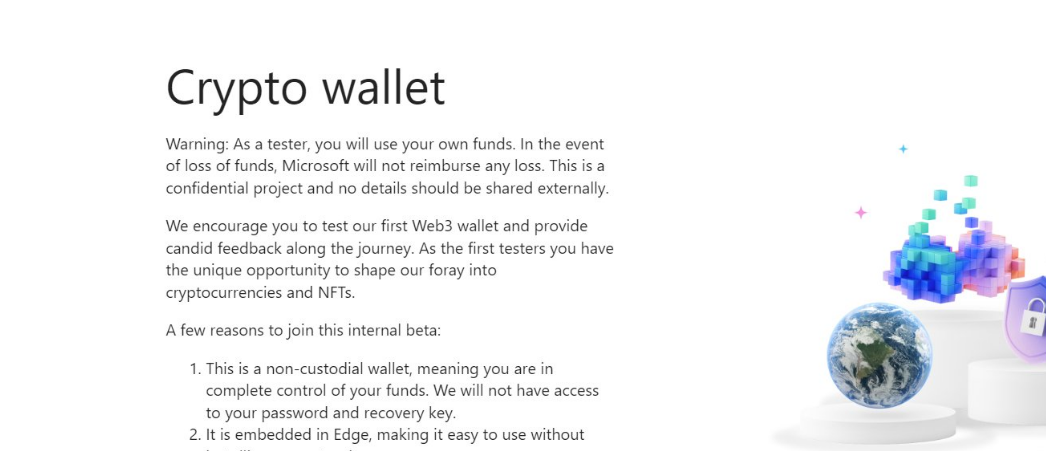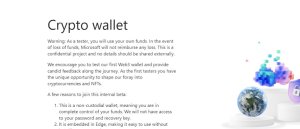Join Our Telegram channel to stay up to date on breaking news coverage
Web3 initiatives and cryptocurrencies are growing rapidly in the industry for mainstream software. To capitalize on the increasing interest of the general public in cryptocurrencies, leading software companies are making their debut in the crypto space with different sorts of products.
The recent example in this line is the entry of Microsoft in the space of crypto wallet. The tech giant has already made headlines with its association with Consensys for its cryptocurrency swap feature, and its vision to launch 3D avatars in Teams.
Apparently, as per some reports, Microsoft is working on a native crypto wallet that would be a part of its own web browser, Edge. The anticipated “crypto wallet” functionality would allow individuals to trade and keep their Ethereum and Ethereum-based tokens in a non-custodial manner. Read ahead as we discuss the features of the crypto wallet and specifications regarding the proposed Ethereum wallet by Microsoft.
Features of Crypto Wallet
A crypto wallet stores the private keys of users’ cryptocurrencies and makes sure that their crypto is kept safe and secure from cyber-attacks. Private keys are the passwords to the cryptocurrencies, which ensure that these digital assets can only be accessible by their owners. Crypto wallets allow their users to share, receive and spend crypto assets, such as Bitcoin and Ethereum. These wallets are available in multiple forms, from hardware wallets like Ledger to smartphone applications.
The importance of these wallets gets enhanced as they protect the private keys of cryptocurrencies, which signifies the ownership of your digital assets. The private keys allow you to undertake transactions, and if any user happens to lose his private keys, he would not be able to access his digital assets. Considering all these reasons, it is important to use a secure crypto wallet to protect your cryptocurrencies. Easy-to-use apps and more advanced security technologies are both available as crypto wallets. The main wallet categories include the following:
Paper wallets: In this wallet, keys are recorded on a physical medium, such as paper, and kept safe in a secure location. Clearly, this renders the utilization of cryptocurrencies more difficult as being digital money, it can only be spent online.
Hardware wallets: In this wallet, the private keys of the cryptocurrencies are kept protected in a device, which can be utilized as soon as it gets connected to a computer. Compared to paper wallets, this wallet is more convenient and secure for keeping your crypto assets safe.
Software wallets: As the name suggests, private keys of the crypto assets are stored in any application or other software. These wallets are highly popular in the crypto community as users can easily send, receive, or spend their cryptocurrencies from their accounts.
Accessibility is crucial for day-to-day trade, so it may be beneficial to use software wallets. But, if you’re planning to keep a significant quantity of cryptocurrency and you prefer security over convenience, you could consider taking a look at hardware wallets. Wallets can also be divided into custodial and non-custodial types along with the categories stated above:
Custodial wallets: In this crypto wallet, the control of the private keys of cryptocurrencies lies in the hands of a custodian or third party. These wallets are less secure as the storage of funds happens online, thereby making them prone to hacking. The wallets usually come along with a backup through which users can easily regain access to their private keys if they lose them for whatever reason. They have lengthy KVC procedures and are best suited to beginners who have recently started their crypto journey.
Non-custodial wallets: Unlike custodial wallets, users have complete control of their private keys to the cryptocurrencies. Since users are allowed to hold their private keys offline in these wallets, they are generally safer. There are limited KYC procedures in these wallets, and users can completely lose their digital money if they lose their private keys for any reason. Given all these reasons, users, who want to keep full control of their funds in their own hands, are best suited to use these wallets.
Microsoft is Working on an Ethereum Crypto Wallet
Microsoft has recently started working on an Ethereum crypto wallet, which is proposed to be a feature of Microsoft Edge. This crypto wallet would help Edge users to undertake crypto transactions by sending, transferring, or spending cryptocurrencies conveniently from their wallet. Users would be able to store their Ether and Ethereum-based crypto assets safely in this wallet. The non-custodial wallet is integrated into Edge’s already-existing wallet functionality for payment card storage.
Since this integration is in a testing stage, testers are required to produce a password and 12-word recovery phrase for keeping their digital assets secure. Once the onboarding process is completed, an Ethereum address for users gets generated through which they can receive funds through the blockchain network. As per the reports, users are allowed to have multiple Ethereum accounts for using this service, thereby allowing them to switch their accounts whenever the need arises. To transfer funds using verified addresses and identities, individuals may sign in and access their accounts.
Though there is no official announcement regarding the wallet service from Microsoft’s end, however, considering that the project is currently in the testing phase, testers have been advised not to keep a large number of assets in this wallet. This isn’t the first time that this tech giant is coming up with something related to crypto. It has already been associated with a blockchain software technology company, Consensys, for providing an inbuilt crypto swap feature between Ethereum, Dai Stablecoin, Uniswap, USD Coin, and Tether Coin, to its users. Further, the company is also in the process of adding 3D avatars to Teams from this summer onwards.
Conclusion
The usefulness of a crypto wallet is certain to grow given the abundance of cryptocurrency transactions occurring all over the world. Most likely, in order to gain access to this new market, numerous tech giants like Microsoft are rushing into the cryptocurrency wallet industry. As of now, this inbuilt Ethereum wallet by Microsoft is in the testing phase, however, as soon as it becomes available to the general public, it would bring on good competition to Metamask.
Read more-
Join Our Telegram channel to stay up to date on breaking news coverage


